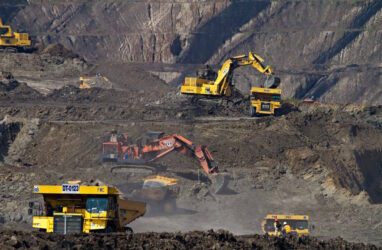Feed aggregator
Here’s what I learned at Cop29. Rows aside, an unstoppable transition to clean energy is happening | Ed Miliband
Britain wanted much better outcomes on many issues, but seeing the ambition at the conference gives me hope for the future
The climate crisis is all around us. And the world is not moving nearly fast enough. In that context, the Cop process for climate negotiations feels frustratingly slow. Yet it is the best mechanism for multilateral action we have, so we have to use it to do everything we can to speed up action.
The UK went to Cop29 determined to play its part in a successful negotiation because it is in our national interest. As the prime minister said in Baku earlier this month, there is no national security without climate security. That is so clear from the effects of Storm Bert over the past couple of days. If we do not act, we can expect more and more of these extreme and devastating outcomes.
Ed Milband is secretary of state for energy security and net zero
Continue reading...BRIEFING: Truckmakers bet on electrification to meet 2030 EU climate targets
Biochar producer plots generating carbon removals from waste in Singapore
I'm glad we got a deal at Cop29 – but western nations stood in the way of a much better one | Mukhtar Babayev
My negotiating team tried in vain to push up support for the global south. Lessons must be learned before the next summit in Brazil
- Mukhtar Babayev is president of the Cop29 UN climate change conference
- China was willing to offer more in climate finance, says Cop29 president
Nine years after the Paris agreement, and after 11 months of multilateral diplomacy and two weeks of the most intense negotiations at Cop29 in Baku, we have a deal. Under the terms of the Baku breakthrough, the world’s industrialised nations will provide $300bn (£240bn), which, combined with resources from multilateral lending institutions and the private sector will reach $1.3tn in climate financing this year. Cop29 also finalised, after years of failed attempts, a global framework for international carbon markets trading, a critical mechanism for less polluting and less wealthy nations to raise climate finance. A fund for responding to loss and damage – another new financial resource for less developed nations – was brought in shortly before the summit, and funds are already being paid into it.
This deal may be imperfect. It does not keep everyone happy. But it is a major step forward from the $100bn pledged in Paris back in 2015.
Mukhtar Babayev is president of the Cop29 UN climate change conference
Continue reading...PFAS and microplastics become more toxic when combined, research shows
Study detects synergistic effect making substances more dangerous, raising alarm since humans are exposed to both
Few manmade substances are as individually ubiquitous and dangerous as PFAS and microplastics and when they join forces there is a synergistic effect that makes them even more toxic and pernicious, new research suggests.
The study’s authors exposed water fleas to mixtures of the toxic substances and found they suffered more severe health effects, including lower birth rates, and developmental problems, such as delayed sexual maturity and stunted growth.
Continue reading...China was willing to offer more in climate finance, says Cop29 president
Azerbaijan’s Mukhtar Babayev criticises western countries for failing to provide enough money for developing world
China would have offered more money to the poor world to tackle the climate crisis if western countries had not failed to show leadership, the president of the Cop29 UN climate summit has said.
Cop29 ended early on Sunday morning after a marathon final negotiating session in the Azerbaijani capital, Baku, with a deal on finance to developing countries that was widely attacked for being inadequate and a betrayal of trust.
Continue reading...Iceberg Data Lab plans to double coverage of corporate nature impacts
Turkiye launches industrial decarbonisation platform, targets $5 bln by 2030
Euro Markets: Midday Update
South Australia orders world’s first 100 pct hydrogen-capable turbines for Whyalla
The post South Australia orders world’s first 100 pct hydrogen-capable turbines for Whyalla appeared first on RenewEconomy.
Indonesia targets 75 GW of renewables as it aims to end fossil fuel generation by 2040
The post Indonesia targets 75 GW of renewables as it aims to end fossil fuel generation by 2040 appeared first on RenewEconomy.
ADB launches plan to scale nature investments
South Korea, Malaysia to work together on international emissions reduction projects
Largest great white shark ever caught in Queensland control program was pregnant with four pups
Female almost the length of a shipping container was found dead on a drumline in August, primary industries department has revealed
- Get our breaking news email, free app or daily news podcast
The largest great white shark ever caught in Queensland’s shark control program died while pregnant with four pups, the primary industries department has revealed.
A female white shark was found dead on a shark-catching drumline near Gladstone in August. Queensland’s Department of Primary Industries took samples for research purposes and has been collaborating with researchers interstate, a spokesperson said.
Sign up for Guardian Australia’s breaking news email
Continue reading...AU Market: Activity, prices soften as updated landfill gas method expected to be signed by year’s end
Fire ant rafts could float down Queensland river after recent heavy rains, expert warns
Growing infestations along the Logan river pose ‘very high risk’ of spreading downstream, Invasive Species Council says
- Follow our Australia politics live blog for latest updates
- Get our breaking news email, free app or daily news podcast
An increase in fire ant infestations along Queensland’s Logan River is raising concerns Australia’s worst invasive species could form floating rafts and spread downstream.
The Invasive Species Council advocacy manager, Reece Pianta, said governments should urgently ramp up eradication efforts along the Logan River, in south-east Queensland.
Sign up for Guardian Australia’s breaking news email
Continue reading...INC-5: BRIEFING – Plastic credit market tipped to grow “with or without” UN treaty
Multilateralism faces a toxic brew of debt, climate crisis and war. It’s time for a reboot | Mo Ibrahim
The stakes are high for donors at next month’s IDA summit in Seoul, but not investing in development means more instability globally
Multilateralism is under attack. A toxic brew of multiplying conflicts, worsening climate impact, new pandemics and spiralling debt has brought the system to its knees, appearing almost incapable of properly addressing these converging crises. Adding the unknowns of a Trump administration into the mix will do little to allay concerns.
My own critiques of the current multilateral system are well documented, but I do not subscribe to the view that it has no future. What’s needed is a total reboot.
Continue reading...Foreign firms taking billions of litres from UK aquifers to make bottled water
Coca-Cola extracts largest amount of freshwater of any drinks company in England, FoI request finds
Foreign multinational companies are extracting billions of litres of water from British aquifers to sell as bottled water, the Guardian can reveal.
Coca-Cola extracts the largest amount of freshwater of any drinks company in England, the data obtained through freedom of information legislation shows. It has a licence to extract 1.59bn litres of water a year from boreholes in Sidcup, Kent for its soft drinks. On top of that, it has the right to take 377m litres for its bottled water brands Glaceau Smartwater and Abbey Well from Morpeth in Northumberland.
Continue reading...




